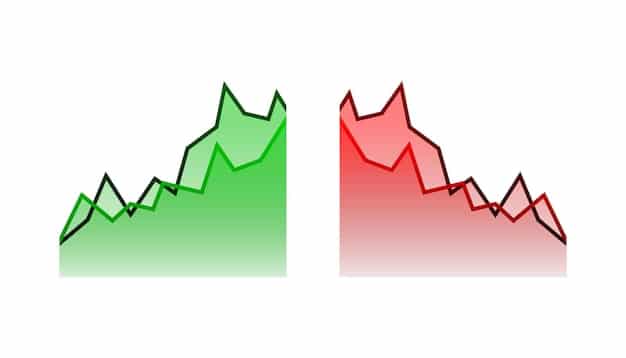Federal Reserve Rate Hike (0.75%): Impact on Mortgage-Backed Securities in 2025

Anúncios
The projected impact of the Federal Reserve’s anticipated 0.75% interest rate hike in early 2025 on Mortgage-Backed Securities (MBS) includes decreased MBS values, increased mortgage rates affecting refinancing and new purchases, and potential volatility in the housing market.
What will be the ripple effects across the financial landscape when the Federal Reserve implements its anticipated 0.75% interest rate hike in early 2025, especially on Mortgage-Backed Securities? Let’s delve into the specifics.
Understanding the Federal Reserve’s Interest Rate Hike
Understanding the Federal Reserve’s interest rate decisions is crucial for grasping their impact on the economy. These decisions influence borrowing costs, investment choices, and overall economic activity. The anticipated 0.75% rate hike by the Federal Reserve in early 2025 is designed to manage inflation and maintain economic stability.
The Role of the Federal Reserve
The Federal Reserve, often called the Fed, is the central bank of the United States. Its primary mission is to promote maximum employment and stable prices in the U.S. economy. To achieve these goals, the Fed uses monetary policy tools, the most prominent of which is adjusting the federal funds rate.
Anúncios
When the Fed raises interest rates, it effectively increases the cost of borrowing money for banks. In turn, banks pass these higher costs on to consumers and businesses in the form of higher interest rates on loans, mortgages, and credit cards. This increase in borrowing costs can cool down an overheating economy by reducing spending and investment.
- Inflation Control: One of the main reasons for raising interest rates is to combat inflation. Higher rates reduce spending and demand, which can help bring down rising prices.
- Economic Stability: The Fed also uses interest rate hikes to prevent the economy from growing too quickly, which can lead to unsustainable economic bubbles and financial instability.
- Market Sentiment: Announcing a rate hike can also influence market sentiment, signaling the Fed’s commitment to maintaining economic order and preventing economic downturns.

In summary, the Federal Reserve’s decision to raise interest rates is a strategic move aimed at maintaining a healthy balance between economic growth and price stability, though not without potential impacts on various financial sectors.
What are Mortgage-Backed Securities (MBS)?
Mortgage-Backed Securities, or MBS, are financial instruments that bundle together home loans and sell them to investors. These securities are a significant component of the housing market and play a vital role in making mortgages accessible to a wider range of borrowers. Let’s explore their specifics.
How MBS Work
When a bank issues a mortgage, it can choose to keep the loan on its books or sell it to a secondary market. This is where MBS come in. Investment firms, like Fannie Mae and Freddie Mac, purchase these mortgages, pool them together, and create a security that investors can buy.
Investors who purchase MBS receive a portion of the mortgage payments made by homeowners. This provides a steady stream of income and makes MBS an attractive investment option for many.
- Diversification: MBS offer investors a way to diversify their portfolio by investing in a pool of many mortgages rather than just one.
- Liquidity: MBS are generally liquid assets, meaning they can be easily bought and sold in the secondary market.
- Risk Mitigation: By spreading the risk across multiple mortgages, MBS reduce the impact of any single mortgage default.
Understanding MBS is crucial because these securities are directly affected by interest rate changes. When rates rise, the value of existing MBS can decrease, and vice-versa.
In conclusion, Mortgage-Backed Securities are critical to the functioning of the mortgage market, turning individual home loans into investment opportunities and influencing interest rates for homeowners nationwide.
Immediate Effects on MBS Values
The value of Mortgage-Backed Securities is inversely related to interest rates. When the Federal Reserve raises rates, the immediate effect is a decline in the value of outstanding MBS. This is due to a few key factors that include market perception and inflation control by the Fed.
Why MBS Values Decrease
When interest rates rise, newly issued mortgages come with higher interest payments. Investors prefer these new, higher-yielding investments over existing MBS that offer lower returns based on older, lower interest rates. As a result, the demand for these older MBS decreases.
This decreased demand leads to a drop in their market value. To attract buyers, sellers of these existing MBS must offer them at a discount, effectively lowering their price to make them competitive with the newer, higher-yielding alternatives.
- Investor Preference: Investors shift their focus to newer, higher-yield MBS, reducing demand for older ones.
- Market Revaluation: The market revalues existing MBS to reflect the new interest rate environment.
- Risk Assessment: Higher interest rates can also signal a potential economic slowdown, increasing the perceived risk of mortgage defaults and further reducing MBS values.
The drop in MBS values can have broader implications for financial institutions holding these securities on their balance sheets, potentially leading to reduced profitability or even losses.

Simply put, the anticipated interest rate hike will likely reduce the market value of existing Mortgage-Backed Securities due to changing investor preferences and a reevaluation of market risk.
Impact on Mortgage Rates for Consumers
Changes in the federal funds rate directly impact mortgage rates. When the Federal Reserve raises interest rates, mortgage rates typically follow suit, making it more expensive for consumers to borrow money to buy homes. This can influence both new purchases and refinancing activities.
Effects on New Homebuyers
For new homebuyers, the most immediate effect is higher monthly mortgage payments. A 0.75% rise in interest rates can add a significant amount to the total cost of a home over the life of the loan. This increase in borrowing costs can make homes less affordable, potentially reducing demand in the housing market.
Potential homebuyers may find themselves needing to save a larger down payment, reduce the amount they are willing to spend on a home, or delay their purchase altogether until rates become more favorable.
Impact on Refinancing
Homeowners looking to refinance their existing mortgages are also affected. As interest rates rise, the opportunity to secure a lower rate through refinancing diminishes. This can discourage homeowners from refinancing, even if they might have been able to save money at lower rates.
- Reduced Affordability: Higher mortgage rates reduce the affordability of homes, impacting first-time homebuyers.
- Decreased Refinancing: Fewer homeowners are motivated to refinance, affecting the overall mortgage market.
- Market Slowdown: The combination of higher rates and reduced refinancing can lead to a slowdown in housing market activity.
Ultimately, an increase in mortgage rates affects both new homebuyers and existing homeowners, leading to changes in housing affordability and market dynamics throughout the industry.
Anticipated Volatility and Market Reactions
An interest rate hike by the Federal Reserve often leads to market volatility as investors and financial institutions adjust to the new economic landscape. The Mortgage-Backed Securities market is particularly sensitive to these changes, and we can anticipate notable reactions.
Market Anticipation vs. Reality
In the months leading up to the rate hike, the market typically begins to price in the anticipated change. This means that the value of MBS may start to decline even before the actual rate hike is implemented, as investors adjust their portfolios.
However, the actual market reaction on the day of the rate hike can be unpredictable. If the rate hike is less aggressive than expected, the market may rally. Conversely, if the increase is larger than anticipated, we could see a more significant sell-off in MBS.
Adjustments by Financial Institutions
Financial institutions holding large portfolios of MBS must also adjust their strategies. They may choose to hedge their positions to protect against further declines in MBS values or reduce their holdings altogether to mitigate potential losses.
- Hedging Strategies: Institutions use financial instruments to offset potential losses in MBS values.
- Portfolio Adjustments: Banks and investment firms may reduce their MBS holdings.
- Investor Behavior: Individual investors may also react, contributing to market volatility.
The anticipated rate hike can set off a chain reaction throughout the financial system, leading to increased volatility and strategic adjustments by various market participants to better safeguard investments and capital.
In summary, the market expects a degree of volatility as participants react to the Federal Reserve’s rate hike announcement and make necessary adjustments to their portfolios.
Long-Term Housing Market Implications
The Federal Reserve’s interest rate policies have far-reaching implications for the long-term health of the housing market. A 0.75% rate hike can influence housing prices, construction activity, and overall investment in real estate.
Potential Impact on Housing Prices
Rising interest rates can put downward pressure on housing prices. As mortgage rates increase, fewer people are able to afford homes, reducing demand. In areas where housing supply is already high, this can lead to price declines.
However, the impact on housing prices is not uniform across all markets. Areas with limited housing supply may see prices remain relatively stable, even with higher interest rates. The overall economic conditions and local market dynamics will also play a significant role.
Effects on Construction and Investment
Higher interest rates can also dampen construction activity. Developers may be less inclined to start new projects when borrowing costs are high, potentially leading to a slowdown in housing construction and decreased investment in real estate.
- Price Adjustments: Rising rates generally apply downward pressure on housing prices over time.
- Construction Slowdown: Developers may pull back on construction due to high borrowing costs.
- Economic Conditions: Local economics significantly impact whether housing markets will remain stable or suffer.
The long-term implications of a 0.75% rate hike extend beyond immediate market reactions, shaping the trajectory of housing prices, construction trends, and investment strategies in the real estate sector. This ultimately influences the economic health of communities and families across the country.
| Key Aspect | Brief Description |
|---|---|
| 📉 MBS Values | Decline due to higher interest rates attracting investors to newer securities. |
| 🏘️ Mortgage Rates | Increase, making home purchases and refinancing more expensive. |
| 📈 Market Volatility | Expected as financial institutions adjust portfolios in reaction to the hike. |
| 🏠 Housing Prices | Potential downward pressure, particularly in areas with high housing supply. |
Frequently Asked Questions
▼
Mortgage-Backed Securities are investment instruments comprising bundled home loans. They are sold to investors, who then receive a portion of the mortgage payments, offering a means of diversification and liquidity in the market.
▼
The Federal Reserve influences interest rates primarily by adjusting the federal funds rate. This benchmark rate affects what banks charge each other for overnight lending, impacting rates for loans, mortgages, and credit cards.
▼
MBS values decline because new mortgages issued after an interest rate hike offer higher returns. Investors prefer these new, higher-yielding securities, reducing demand for older MBS with lower yields.
▼
New homebuyers and those looking to refinance are most affected by rising mortgage rates. New buyers face higher monthly payments, decreasing affordability, while refinancing becomes less attractive for current homeowners.
▼
Potential mitigation strategies include hedging MBS positions to avert market volatility and carefully considering mortgage options before committing to substantial investments under volatile circumstances caused by interest rate alterations.
Conclusion
The Federal Reserve’s anticipated 0.75% interest rate hike in early 2025 exerts significant influence on Mortgage-Backed Securities and the housing market, affecting values, rates, and stability; understanding these implications is key for investors, homeowners, and prospective buyers aiming to navigate future financial landscapes.





